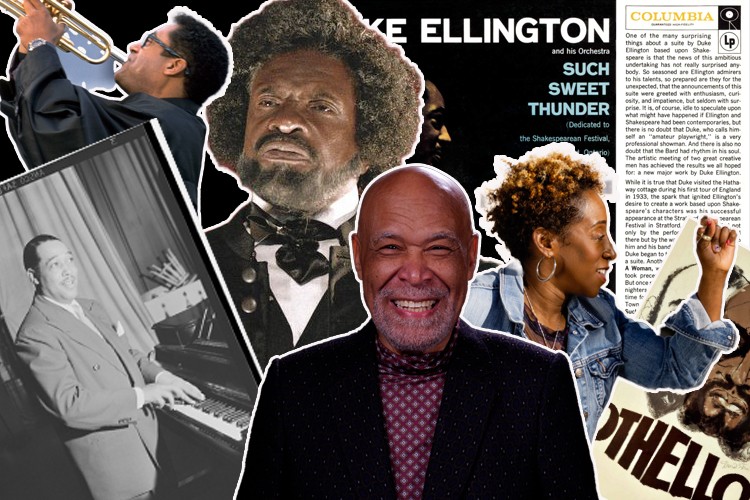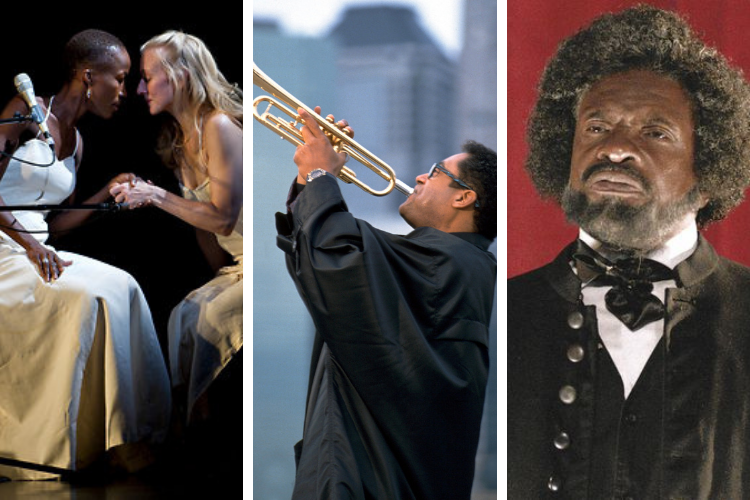How Do Duke Ellington, Harlem, and Shakespeare Connect and Speak to Our Current Moment?
Columbia's event series 'Such Sweet Thunder' is set against the backdrop of Harlem, speaking to our current moment of war, racism, and plague.

You don't need to know a lot about jazz to know that Duke Ellington is a cardinal figure in the history of the genre as its most prolific composer. And Duke Ellington's history is deeply entwined with Harlem, where he rose to prominence in the 1920s through his orchestra's appearances at the Cotton Club. That's why it just makes sense that Columbia's new, year-long public event series "Such Sweet Thunder," has Harlem as its de facto backdrop, featuring performances in the neighborhood as the series explores Duke Ellington's connection to Shakespeare and what that connection may enlighten us about today.
Similar to the celebration of Romare Bearden several years ago, "Such Sweet Thunder," combines art exhibits, dance, musical performance, theater, and roundtable talks to approach the subject from a 360-degree perspective. There's something for everyone.
Neighbors sat down with Robert O'Meally, Zora Neale Hurston Professor of English and Comparative Literature at Columbia, to learn more and get advice on what events might be of the greatest interest to our readers.
Why is the 'Such Sweet Thunder' series happening right now?
There was a point a few years ago when I was listening to the Such Sweet Thunder album by Duke Ellington and it occurred to me that it was a brilliant piece that not many people knew. I thought, "we should really present this on-campus" and then it occurred to me that this could be kind of a vehicle for cross-disciplinary study and, because Ellington is so associated with Harlem, it occurred to me that this could be a way of broadening our sense of community very far beyond the campus walls. We talk about Columbia University in the City of New York, but it is really Columbia University in the Village of Harlem as well.
Here’s Ellington, who off and on lived in Harlem, and here's Shakespeare, who is very popular with the Harlem community, to begin with. In fact, an actor named William Harrison once said that when he would deliver his Shakespearean act in Harlem, very often people in the theater would begin reciting the lines with him. And so it occurred to me that it would be a way to use Columbia's solid rock of the Core Curriculum as a basis for which to talk about Ellington and Shakespeare and other related matters.
Set the stage for those who may not be jazz buffs. What is the significance of Duke Ellington?
Ellington is sometimes called the 20th century's greatest composer. He's unique in that like Shakespeare he had his own favorite troupe that traveled with him and he wrote for them as Shakespeare wrote for the actors that he worked with. So he knew exactly what Cat Anderson's best notes were and he knew the strength of Britt Woodman on trombone. So he's writing specifically to highlight and challenge and entertain those particular players and that I think is what defines them as more than most jazz music.
On top of that, Ellison was writing his own compositions night after night. More than 2000 albums are in the Ellington archive at the Smithsonian. The players say that late at night, after the gig, after they had a bite to eat and whatnot, under the hotel room door would come the composition that they were expected to have ready by the morning, that they were going to rehearse that next day, and maybe play that next night. It's a phenomenal talent.
More than any other word in the Ellington cannon is the word Harlem, He wrote tributes to Harlem, dance pieces for Harlem, portraits of Harlemites. His music is so Harlem-related that it's part of what defines him.
He wrote 16 lines almost every night of his life and he wrote for birthday parties, he wrote for the theatrical presentations, sometimes for jugglers. He wrote for an ice show, he would write for whatever they wrote for the movies. So, he was truly an American composer in all these specifically American contexts, not just the concert hall.
What makes his interpretation of Shakespeare different from others?
The Such Sweet Thunder piece was a request by the Ontario Shakespeare Jazz Festival that Ellington participated in one year, but he realized while he was there that there were other people who had done special Shakespearean writing, whether for music or for the theater. And so, he promised the woman who invited him and said “invite me again next year and I'll come back with something appropriate and so he wrote a portrait of Julius Caesar, he wrote a portrait of Henry V, whom he called Hank, and he wrote a portrait of Antony and Cleopatra, Romeo and Juliet.
What's special there is in each case you might say that he "Harlem-izes" the portraits: he called a Lady Macbeth “Lady Mac” and he said, “Lady Mac had a little ragtime in her soul, I can guarantee you that.”
He wrote what he called “A Sonnet for A Moor,” about Othello, but also a love song. His portrait of Hamlet, who he called “Ham,” for a while they renamed it “madness and great ones.” He was offering praise songs, in some cases to people who are killers or who are villains, as if he's insisting on seeing another side of them.
RELATED CONTENT
Such Sweet Thunder as a piece is quite important as a set of portraits and he makes us look again and see the swagger in Othello and to see the caginess and fun in Hamlet. He makes us think again about Romeo and Juliet – they were 14 years old, and so the love that they had didn't mean the same as the adult love of Antony and Cleopatra. Part of what we get here is a meditation on power and other matters of state, like sovereignty. That's part of what makes it interesting and fun and intriguing.
The 'Such Sweet Thunder' event series has Harlem as a backdrop. How is this series entwined with the neighborhood? Who from the neighborhood will be performing?
Well, right from the beginning, I called my friend, Patricia Cruz, who is in charge of Harlem Stage, and I said look “Let's think of something that we can do together.”
I told her that I had been talking to actor Keith David about doing Frederick Douglass in Harlem or Douglass plays Shakespeare in Harlem or something like that and she was immediately on-board. So, really, our most ambitious production will be done with Harlem Stage and that's a very important one from us for us.
Sabrina Peck, director of CityStep, is doing a project with Harlem School of the Arts involving children, but she is also involving Columbia dancers, and young Harlem dancers, and we want to involve also senior leaders of the dance scene. We’ll be creating a dance production at Miller Theatre (on Columbia’s campus) that puts the motion to the music of Duke Ellington.

For the busy person who may not be able to attend all events in the series, what are some events you’d recommend right off the bat?
- Well, I would say people should walk over to the Wallach Gallery and see "The Othello Prints" etchings by Chris Ofili. He did 12 etchings of Othello as a man with very, very dark skin and with markings associated with certain parts of Africa. He also gives the viewer a slight smile and we're made to ask ourselves “is there a performative and even a comic element to this man who talks about his travels and escapades?” The gallery is free and open to the public.
- Another place to come in to the series is a concert that will be played by Jon Faddis, "Such Sweet Thunder Live" on March 10 at 8 p.m. at Miller Theatre on Columbia's campus. He’s going to bring the best players you can find in New York City and he’s going to work to blow that music off the stage. Tickets are $10.
- I would read also Toni Morrison’s play “Desdemona,” which is Morrison’s sidelong glance at “Othello.” There’s a panel about it on April 12 at 6 p.m. involving Columbia faculty members Farah Jasmine Griffth, Jean Howard, and Rebecca Kastleman and I can’t wait to see what they say about it. This event is free and open to the public.
- And, of course, there’s “Douglass Plays Shakespeare” at Harlem Stage from March 31 to April 2. Frederick Douglass was quoting Shakespeare's Hamlet in his first slave narrative. Where did this guy come from? Keith David will be portraying Douglass and that’s one not to miss. Tickets are not yet on sale.
More information on Such Sweet Thunder can be found here. All events are listed on the Neighbors calendar as well.